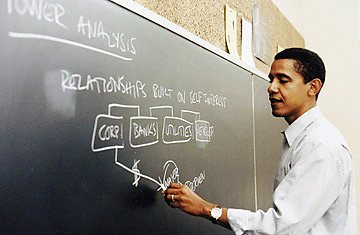
Barack Obama teaching at the University of Chicago Law School
As the presidential race heats up and Democratic nominee Barack Obama is forced to respond to increasingly tough attacks from the Palin-energized GOP ticket, his campaign style is coming under growing scrutiny. Some feel the candidate has too often been more head than heart, more intellectual than passionate, less a leader than a lecturer. Will his style survive the rough-and-tumble of a modern media-saturated presidential campaign?
Yet balancing the two personae — professor and politician — has been key to Obama's success. Much of his style can be traced back to his dozen years as an academic, at the University of Chicago Law School. A look at those teaching days reveals just how he has managed to be at once popular and intellectually exacting.
By most accounts, Obama's time at the law school was a huge success. He arrived in 1992, fresh out of Harvard Law School, to juggle teaching courses in constitutional law and race theory. Within a few years, he had become a rock-star professor with hordes of devoted students, written a popular book and launched a political career as an Illinois state senator.
The University of Chicago sits on the city's South Side in a neighborhood called Hyde Park, an enclave of tree-lined streets, upscale condos and cafés. The law school is a space agey, 1960s-era glass-covered building on a campus largely modeled after Oxford University. Classroom No. 5 was Obama's favorite. It's a spare space on the building's first floor, with a stretch of windows overlooking a parking lot. Obama usually sat at a desk front and center in the room, before several semicircled rows of students. "What are the principles we can glean from this case?" he'd often ask as he began each class. Sometimes he'd wait for students to voluntarily make their arguments; other times he'd "cold call" them by name. Obvious answers wouldn't work. Nor would a simple "Yes, I agree." It was like a conversation.
"There was a lot of give-and-take," says Marta Lowe, who took Obama's Current Issues in Racism and the Law class during the spring of 1995. "There was no pontificating from on high about what we should think. It was us organically coming up with kernels of wisdom." Obama in academe proved to be more charismatic than academic. Evaluations by students reviewed by TIME gave him consistently high ratings. For a winter 2003 course called Voting Rights and the Democratic Process, for example, he received a 6.07 out of a possible 7 for "overall evaluation of teaching performance."
His exams as well were engaging and almost communal. Consider the one he gave for Constitutional Law III in the Fall 1997 semester. Students were told to act as attorneys in the make-believe state of Futura, advising the parents of a 23-year-old woman named Dolly, who had established a living will before sustaining near fatal injuries in a car accident. The will empowered her parents to make "any and all decisions regarding medical treatment," including terminating "life-sustaining treatment." The parents wanted to clone Dolly by taking a healthy cell from her body and inserting it into an embryo whose genetic material had been removed. The case hinged on a single question: Did the state's ban on such cloning violate the constitutional rights of Dolly and her parents? "You do not need to arrive at a definitive conclusion," Obama advised in the five-page exam. "Instead, make the strongest possible argument for each claim. Be sure to consider the possibility that Futura's ban on cloning does in fact encroach on some constitutionally recognized rights, but is nevertheless constitutional."
(See here for a sample University of Chicago Law School exam given by Barack Obama.)